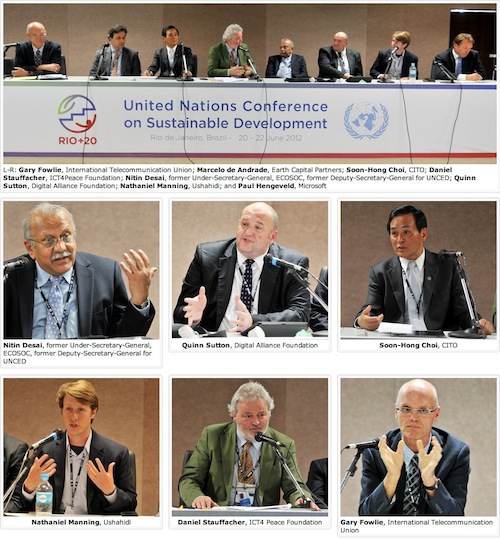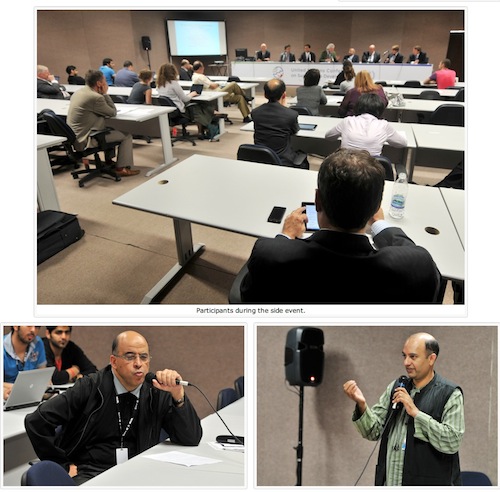Organized by the Global Alliance for Information and Communication Technologies and Development (GAID) and Office of UN’s Chief Information Technology Officer (CITO)
Introduction
The intersection of Information and Communication Technology (ICT), with the challenges of environmental, social and economic sustainability forms a critical nexus for the future of sustainable development and poverty eradication. Technology has long played a crucial part in economic and social development, and its evolution has continually raised the thresholds of possibility. In order to unleash the full potential of technology as an enabler for sustainable economic and social development throughout the developing world, a global strategy leveraging the power of technology is needed.
The importance of sustainability has been recognized in development policy since the United Nations first Summit on that theme in the early 1990s and today it is being revived with the RIO+20 Summit that aims at securing renewed political commitment. A sustainable development approach must be holistic and analyze its three pillars: economic, social and environmental trends, and the interactions between them. The link between ICT and sustainable development recognizes the existence of both significant opportunities and threats. On the one hand, there is optimism that the “new economy” will bring “dematerialization”, a reduction in movement of goods, and a general decoupling of economic growth and resource use, on the other hand, there is fear that current unsustainable trends will be worsened. Without a holistic approach, the sustainable use of ICT alone will not deliver the goals of social and environmental sustainability. Common efforts from governments, civil society and businesses alike are needed.
Detailed programme
The Panel
The Panel looked at two main themes:
- Exploring the potential of ICT as a major tool in addressing the current challenges of sustainable development; and
- Identifying key actors, governments, NGOs and the private sector that are implementing the ICT aspects of sustainable development, and understanding their approaches and challenges.
Moderator
- Mr. Daniel Stauffacher, Chairman ICT4Peace Foundation and Co-Chair Global Alliance for ICT and Development (GAID)
Panelists
- Mr. Soon-hong Choi, ASG, Chief Information Technology Officer, United Nations
- Mr. Nitin Desai, former USG Department of Economic and Social Affairs, United Nations, SG of Rio +10 and former Chairman of the Internet Governance Forum (IGF)
- Mr. Marcelo de Andrade, Earth Capital Partners
- Mr. Paul Hengeveld, Senior Director International Organizations, Microsoft.
- Mr. Nathaniel Manning, Ushahidi
- Mr. Quinn Sutton, Executive Director, Digital Alliance Foundation
Mr. Daniel Stauffacher, Chairman of the ICT4Peace Foundation and Co-Chair of GAID, moderated the event and opened the meeting asking panellists to address how sustainable development can be linked to ICT sand invited them to give concrete examples on how ICTs can help save resources, protect the environment and empower economic and social development. Mr. Stauffacher also invited participants to mention challenges at the policy levels.
Dr. Soon-Hong Choi, UN Chief Information Technology Officer, emphasized that sustainable development cannot be achieved without peace and security, and shared the work of the UN within the core areas of peace and security, social and economic development, humanitarian assistance, human rights, and international dispute resolution. Mr. Choi reminded participants that the United Nations charter is dedicated to five key areas, and that ICTs plays an important role in all of them.
Mr. Nitin Desai, Secretary-General, WSSD, said Rio+20 would not be needed if sustainable development had advanced at nearly the pace ICT has. He underscored that ICT carries significant potential to underwrite sustainable development by enabling efficiency gains through two-way communication tools like the smart grid, and fostering social opportunities by spreading information through cell phones and other affordable technologies.
Mr. Marcelo de Andrade, Director of Business Development at Earth Capital Partners, provided a business perspective on the contributions of ICT to resource efficiency and human empowerment. As an example, he conveyed the great gap that exists between the skills of horticulturalists, and those of economically viable agricultural businessmen. He described ICT as a powerful tool to close the skills gap and create economic opportunities for the rural poor in a cost effective manner.
Mr. Paul Hengeveld of Microsoft, indicated how his company has a comprehensive view of sustainable development, since ICT is most effective if it is used in every part of the equation. Microsoft uses sensor and small devices to make its building smart and reduced the energy use of more than 25%. With the European Environment Agency Microsoft developed Eye on Earth, to measure air and water quality. It is important, he added, that Mobile phones can provide us good real time insight on the state of our environment.
Mr. Nathaniel Manning, Ushahidi, talked about the contributions that ICT brings in building entrepreneurship in developing countries. Mr. Manning indicated that the ICT4D community should focus on being not a conduit for aid, but a catalyst for businesses and start-ups in the developing world. He touched upon the connection between ICT and energy and gave examples of companies inventing pre-paid solar-energy systems using mobile infrastructure that are great examples of sustainable development and ICT.
Gary Fowlie, International Telecommunication Union, explained that policy built on the principles of sustainable development is critical for ensuring that the development of ICT brings benefits, inclusion, and information to all people of the world, and that universal internet access by 2020 is an achievable goal with coordinated action. Mr. Fowlie reiterated how ICTs is a cross cutting catalyst for all three pillars of sustainable development – economic growth and prosperity, social inclusion and environmental sustainability and should be considered basic infrastructure on par with water, energy and transportation. He reiterated how ICT and internet access has the potential to be a great enabler for the UN mission to deliver peace, security and development to all.
Quinn Sutton, Digital Alliance Foundation, added that in addition to the digital divide we witness a skills gap divide among nations. Sutton argued that ICTs present opportunities to foster dialogue and share information and that the even the most senior participants in the greater international community need to obtain a better understanding of the potential of ICT and more importantly how to implement them into holistic sustainable development strategies. Sutton advocated for a continued ICT education plan across all sectors, organizations and audiences to enable the promise of ICT as a development tool.
In the ensuing discussion, participants discussed the importance of observation networks for disaster prediction and the need to design ICT for those with disabilities. Desai summarized the session, cautioning against the mesmerisation with technology as an end in itself, and heeding participants to account for the environmental impacts for ICT.
Text and images taken from IISD Reporting Service.


